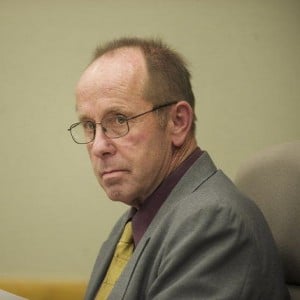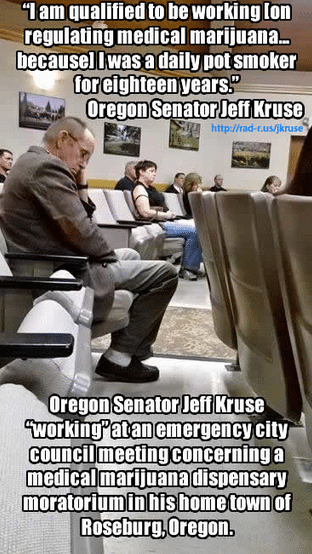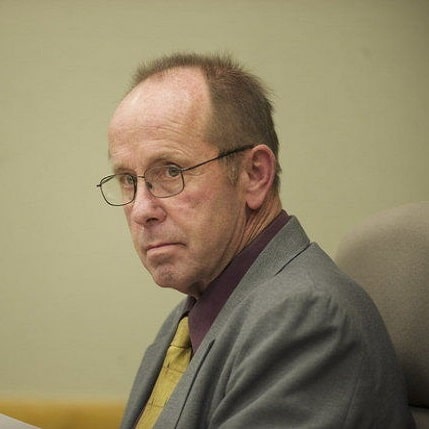
Oregon Senator Jeff Kruse co-sponsored Senate Bill 964, which was passed this week by the Oregon Senate, and is a clear attack on the Oregon Medical Marijuana Program. The bill does many things, some of which include putting new plant limits on growers, requiring over burdensome reporting for all medical marijuana growers, and the ability for municipalities to ban marijuana businesses without a vote by the municipalities residents. Jeff Kruse was supposed to be working on implementing Oregon Measure 91, which Oregon voters approved overwhelmingly, and which included language no less than three times specifying that the Oregon Medical Marijuana Program (OMMP) should remain untouched.
So why is Jeff Kruse attacking the OMMP? He sent out an e-mail recently to his constituents that explained his actions (dated May 22nd). The e-mail was forwarded to me by a reader (thanks!) and I figured I would post it in an effort to provide equal time to a marijuana opponent, and to let his own words explain his poor decision to introduce and push Oregon Senate Bill 964:
I have received a lot of phone calls and emails on the subject of marijuana, which advocates say we should call cannabis, but for the sake of brevity in this letter I will call it pot. While a good number of these have been thoughtful and courteous, a large number and been vulgar and even threatening. To those in the latter category, if you are trying to make a valid point with a legislator, you are going about it the wrong way. I can’t speak for my colleagues, but personally I don’t respond to such tactics and have little respect for those who use them.
Before I go any further it might be a good idea to once again tell you why I am qualified to be working in this subject area. First, I am a recovering addict. I have been drug and alcohol free for 29 years; but, among the other things I did, I was a daily pot smoker for eighteen years. Additionally I have been involved legislatively with the medical marijuana program since the passage of the ballot measure in 1998. I entered this Session with a lot of thoughts, but two primary objectives. The first was to protect the integrity of the medical program and the second was to attempt to end the black market sales in Oregon. Senate Bill 964 (which deals with the medical program) goes a long way to achieving those objectives.
 Many have asked why we are dealing with the medical program when Ballot Measure 91 was about recreational use. The short answer is because of the direction we have received from federal government on the subject. We need to remember that pot is a schedule 1 narcotic at the federal level, and they expect a much higher level of accountability than we currently have in the system, which is actually no accountability at all. For example, if we assume two pounds of pot for each of the 71,000 patients that would give us a total of 142,000 pounds accounted for in the system. However, the conservative estimates from OSU tell us there is well over a million pounds being produced (and other estimates take us to a much larger number). There is clearly no way we can claim we know where the pot being produced is going, but one would have to assume it is going into the black market. According to the Cole Memorandum from the US Department of Justice this is a red flag which could jeopardize the recreational program. SB 964 includes a tracking system which, with the support of the Governor’s office, will satisfy the feds on the issue of accountability.
Many have asked why we are dealing with the medical program when Ballot Measure 91 was about recreational use. The short answer is because of the direction we have received from federal government on the subject. We need to remember that pot is a schedule 1 narcotic at the federal level, and they expect a much higher level of accountability than we currently have in the system, which is actually no accountability at all. For example, if we assume two pounds of pot for each of the 71,000 patients that would give us a total of 142,000 pounds accounted for in the system. However, the conservative estimates from OSU tell us there is well over a million pounds being produced (and other estimates take us to a much larger number). There is clearly no way we can claim we know where the pot being produced is going, but one would have to assume it is going into the black market. According to the Cole Memorandum from the US Department of Justice this is a red flag which could jeopardize the recreational program. SB 964 includes a tracking system which, with the support of the Governor’s office, will satisfy the feds on the issue of accountability.
The issue that split the Joint Committee was the local option relative to the location of dispensaries. All of the Senate members of the committee wanted a local option provision, but three of the five House members didn’t. Over that issue the committee split and a Senate-only committee was created, which passed out SB 964. For those keeping track of such things, if the House had agreed it would have been SB 844. Our version allows a local jurisdiction (city or county) to decide if they want to allow dispensaries, including the time, place and manner of the operations. It has two other provisions, one which would allow the people to put a measure on the local ballot with only 4% of registered voters being required and the second gave local governments 180 days to decide to give adequate time for people to put something on the ballot. It should also be noted all existing dispensaries and those that have gone through the permit process would still be in place. We are hoping to get similar provisions on tracking and local options in the recreational bill, which is currently HB 3400 (which we just started working on).
An interesting side note on “the will of the people.” Clearly the voters passed medical marijuana in 1998 and we have been working to improve the system since that time. It is also true the people passed Measure 91 at the last election, which compels us to implement the recreational program. What I have always found to be interesting is what is defined as an “overwhelming majority.” In the case of Measure 91 the yes votes were 56%, which for some reason qualifies under the overwhelming category. What tends to be forgotten is the fact 44 out of 100 people voted no, which I think is actually significant. What I mean by that is the fact that those who voted no should not be totally ignored. As a Senator I don’t represent just those who voted for me, I represent all the people of my district. I personally don’t think 56% is overwhelming, especially when in some parts of the state the vote went the other way. This is the primary reason I am supporting the local option, because I would prefer the state not dictate to communities much in the same manner I don’t like the federal government dictating to the states. My favorite example is the education system. The more the federal and state governments have been dictating to school districts, the worse the outcomes have become.
The legalization of marijuana is a major change in this state. We are committed to doing what we can to make sure we do it right. I just think it is important to not step on the rights of communities and the people in those communities in the process.
Sincerely,
Senator Jeff Kruse





